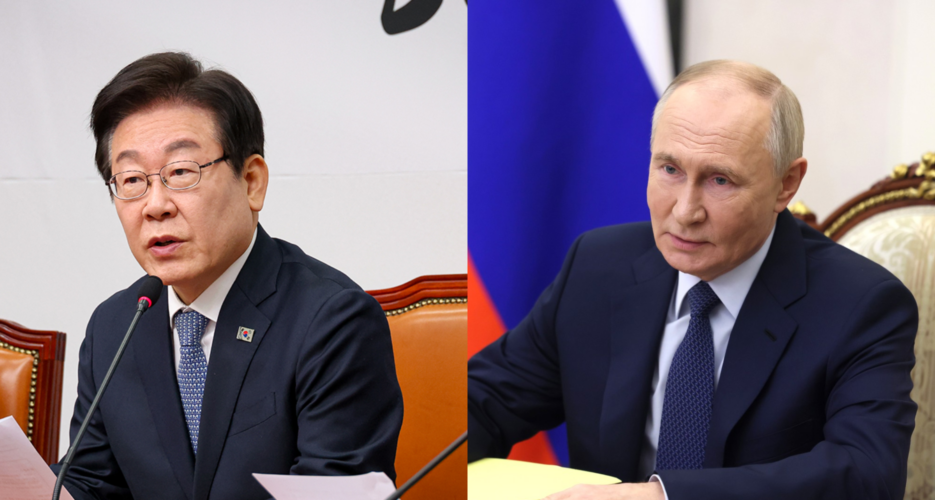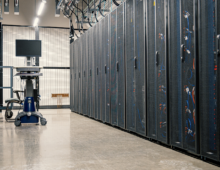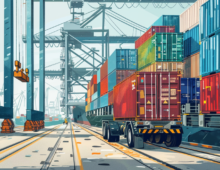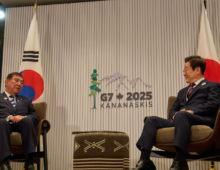|
Analysis South Korea’s next president could reset Russia relations amid global shiftsEconomic pragmatism could replace Yoon’s ideological diplomacy as Seoul navigates energy, trade and security concerns John LeeFebruary 5, 2025  Main opposition Democratic Party leader Lee Jae-myung meets with party officials on Feb. 5, 2025; Russian leader Vladimir Putin meets with members of his security council | Images: Democratic Party of Korea and Russian Presidential Executive Office. Edited by Korea Pro. South Korea’s relationship with Russia, both diplomatically and economically, has reached its lowest point since the Cold War. Under President Yoon Suk-yeol, Seoul aligned closely with Western-led sanctions following Russia’s invasion of Ukraine, further exacerbating tensions as Moscow deepened military cooperation with North Korea. However, two major geopolitical shifts are poised to reshape South Korea’s foreign policy: Yoon’s anticipated removal from office followed by main opposition Democratic Party (DP) leader Lee Jae-myung’s likely ascent to the presidency, and the evolving trajectory of the Ukraine war under the Donald Trump administration. A post-Yoon administration under Lee would likely shift South Korea’s foreign policy away from lockstep ideological alignment with the West and toward pragmatic economic engagement. While Russia’s security partnership with North Korea may have altered its Korea policy, the transactional nature of Moscow’s relationship with Pyongyang suggests an opportunity for Seoul to attempt re-engagement, albeit cautiously. South Korea’s next government will likely seek to balance economic opportunities, security concerns and potential backlash from Western nations while reassessing its approach toward Russia. CURRENT STATE OF RELATIONS Before Russia’s invasion of Ukraine, South Korea and Russia maintained robust trade relations, particularly in energy, shipbuilding and aerospace. Under former President Moon Jae-in, Seoul sought pragmatic engagement with Moscow, keeping diplomatic channels open even as tensions rose between Russia and Western nations. This approach changed dramatically under Yoon, who aligned closely with the U.S. and the North Atlantic Treaty Organization (NATO). His administration imposed additional trade restrictions on Russia, citing security concerns over its deepening relationship with North Korea. Moscow responded with economic countermeasures, warning of potential retaliation against South Korean businesses. The situation deteriorated further when Yoon’s government considered providing lethal aid to Ukraine, prompting Russian leader Vladimir Putin to remark that doing so would be a “very big mistake” and promising that Moscow would respond in a manner that “the current leadership of South Korea is unlikely to like.” The result has been a near-total breakdown in ROK-Russia relations, with South Korean companies such as Hyundai facing significant financial losses in Russia. However, this hardline stance will likely shift under a new South Korean administration that prioritizes economic diplomacy.  Russian leader Vladimir Putin and North Korean leader Kim Jong Un at a welcome ceremony in Pyongyang, June 20, 2024 | Image: KCNA POLITICAL AND ECONOMIC SHIFTS Although Lee Jae-myung faces pending criminal trials, which could disqualify him from running for office, polls still indicate that he is most favored to become South Korea’s next president should Yoon’s impeachment be upheld. If elected, Lee’s foreign policy will likely prioritize economic stability, improved relations with China and a recalibration of South Korea’s stance toward Russia. Unlike Yoon’s value-based diplomacy, Lee’s party has emphasized national interest-driven policies, focusing on economic opportunities over ideological alignment. Meanwhile, the Ukraine war appears to be heading toward a negotiated settlement under Trump’s administration. Trump’s advisers have urged Ukraine to hold elections while Trump himself suggested that he would continue to provide military assistance to Kyiv, once the U.S. gains access to the country’s rare earth materials. As long as the war continues, the next South Korean government is unlikely to spearhead any significant change in the country’s Russia policy. For instance, Seoul will most likely be preoccupied with domestic divisions that have resulted from Yoon’s impeachment and arrest and responding to Trump’s protectionist trade policies. However, if the war in Ukraine ends through a negotiated settlement, with Russia retaining its occupied territories and Ukraine securing security guarantees, the next South Korean government may argue that it is no longer necessary to isolate Moscow. Russia’s economic and military weaknesses also present openings for South Korea. According to the International Monetary Fund, the World Bank and the Organization for Economic Cooperation and Development, Russia’s economy has contracted significantly under sanctions, experiencing trade disruptions and inflation. Moreover, the Royal United Services Institute reported that Russia’s military is struggling to replace losses due to the attritional nature of the conflict, indicating long-term constraints on its ability to project power. These vulnerabilities make it likely that Moscow will seek new trade partners beyond China, positioning South Korea as a potential beneficiary.  South Korean President Yoon Suk-yeol meets with Ukrainian President Volodymyr Zelensky in Kyiv, July 15, 2023 | Image: ROK Presidential Office SOUTH KOREA’S OPTIONS A post-Yoon administration will have multiple avenues for engaging with Russia while managing security risks and diplomatic constraints. Ukraine and reconstruction South Korea has already positioned itself to assist in Ukraine’s post-war reconstruction. Lee Jae-myung’s administration will likely continue supporting reconstruction efforts while refraining from direct military involvement. At the same time, Russia will also require significant reconstruction efforts due to Ukrainian attacks on its energy infrastructure and weapons depots. South Korea’s construction and advanced technology sectors could play a role in this rebuilding process, though the latter would require a relaxation of Western-imposed trade restrictions. Energy and resource trade Under Yoon, South Korea significantly reduced its imports of Russian oil. However, a Lee administration could explore reopening energy trade with Russia to diversify South Korea’s supply sources and hedge against geopolitical risks. For instance, shipping companies remain cautious about returning to Red Sea crossings despite Yemen’s Houthi rebels stating that they would end attacks against international maritime vessels in the area following the ceasefire between Israel and Hamas. Moreover, while the U.S. and Canada have agreed to postpone their tariffs against each other for a month, an intra-North American trade war could lead to increased global energy prices, which may threaten South Korea’s weak economic growth prospects while raising the specter of inflation yet again. With European Union (EU) sanctions likely to remain in place as long as Russia retains control of its occupied territories in Ukraine, Moscow will be increasingly dependent on Asian markets, giving Seoul an opportunity to negotiate favorable terms.  An ice-breaking vessel | Image: Canva Shipbuilding and Arctic trade The melting Arctic presents new economic opportunities, particularly in shipping and infrastructure. Russia seeks to expand its Arctic trade routes but requires advanced shipbuilding capabilities, such as ice-breaking vessels — an area where South Korea excels. Although China is also a major player in Arctic investments, Russia may prefer to diversify its partnerships to reduce overreliance on Beijing. A cautious but strategic engagement in Arctic trade would allow South Korea to gain economic benefits without triggering Western sanctions. Balancing and security concerns Despite potential economic benefits, South Korea cannot ignore the security risks posed by Russia’s military cooperation with North Korea. The DP condemned North Korea’s deployment of its troops to Russia in October but also called for a diplomatic approach rather than outright confrontation. A Lee administration would likely seek backchannel negotiations with Moscow to gauge whether economic engagement could be leveraged to limit Russia’s security partnership with North Korea, though success in this area is uncertain. To that end, South Korea’s strategy will likely involve maintaining strong security ties with the U.S. and NATO while cautiously exploring economic opportunities with Russia.  President Yoon Suk-yeol meets with then-NATO Secretary-General Jens Stoltenberg, July 11, 2024 | Image: ROK Presidential Office CHALLENGES AND WESTERN REACTIONS While Trump may not strongly oppose South Korea’s engagement with Russia, European nations could present challenges. For instance, countries such as Poland, Estonia and the Czech Republic have taken hardline stances against Russia. However, these same nations rely on South Korean weapons and nuclear power technology, making a full economic backlash unlikely. South Korea could mitigate European concerns by emphasizing its commitment to environmental, social and governance principles and carbon neutrality, aligning with broader EU trade interests. Domestically, South Korea’s conservatives will likely resist any move toward re-engagement with Russia while a Lee administration would likely frame its policy as an effort to recover business losses and secure economic growth rather than a political realignment. LOOKING AHEAD The anticipated shifts in South Korea’s leadership and the potential end of the Ukraine war create an opportunity for reassessing ROK-Russia relations. A Lee Jae-myung administration is expected to prioritize economic diplomacy, seeking ways to restore trade and investment ties while maintaining security cooperation with the U.S. and NATO. While Lee will likely be cautious given Russia’s ties with North Korea, the likelihood of pragmatic re-engagement remains strong. If executed strategically, a recalibrated approach could allow Seoul to benefit from new trade opportunities without compromising its broader geopolitical commitments. Edited by Alannah Hill South Korea’s relationship with Russia, both diplomatically and economically, has reached its lowest point since the Cold War. Under President Yoon Suk-yeol, Seoul aligned closely with Western-led sanctions following Russia’s invasion of Ukraine, further exacerbating tensions as Moscow deepened military cooperation with North Korea. However, two major geopolitical shifts are poised to reshape South Korea’s foreign policy: Yoon’s anticipated removal from office followed by main opposition Democratic Party (DP) leader Lee Jae-myung’s likely ascent to the presidency, and the evolving trajectory of the Ukraine war under the Donald Trump administration. Get your
|
|
Analysis South Korea’s next president could reset Russia relations amid global shiftsEconomic pragmatism could replace Yoon’s ideological diplomacy as Seoul navigates energy, trade and security concerns  South Korea’s relationship with Russia, both diplomatically and economically, has reached its lowest point since the Cold War. Under President Yoon Suk-yeol, Seoul aligned closely with Western-led sanctions following Russia’s invasion of Ukraine, further exacerbating tensions as Moscow deepened military cooperation with North Korea. However, two major geopolitical shifts are poised to reshape South Korea’s foreign policy: Yoon’s anticipated removal from office followed by main opposition Democratic Party (DP) leader Lee Jae-myung’s likely ascent to the presidency, and the evolving trajectory of the Ukraine war under the Donald Trump administration. © Korea Risk Group. All rights reserved. |











